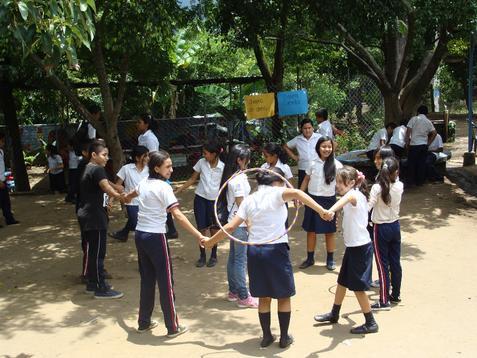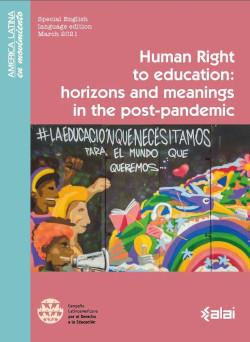A social pact for education
Education cannot take place without, for example, peace. Education cannot take place without children having access to drinking water.
- Opinión

| Article published in ALAI’s magazine No. 551: Human Right to education: horizons and meanings in the post-pandemic 05/03/2021 |
"Education must be regenerated, it must be an education in which, more and more, there must be a social pact, which is essential to be able to organize among communities, among individuals. There should no longer be these issues of power... this power-play that exists, in which a small minority holds power at world level and imposes its criteria on others. And for this to change, the majority of the population must be educated; but an education with critical thinking and a good capacity for resilience". Thus affirmed the UN Special Rapporteur on the Right to Education, Koumbou Boly Barry, in an interview with CLADE.
In the interview, the Rapporteur spoke about the situation of the human right to education in Latin America and the Caribbean, in the current context of the COVID-19 pandemic, as well as its projections for the coming years and she stated that, although we already know the first phase, "we still do not know all the consequences of this COVID-19 on education", not only from the viewpoint of quality, but also of governance and access for the most marginalized groups. Even before the pandemic, there were one billion illiterate people in the world, mostly women and disadvantaged people: refugees, migrants, poor families and other minorities with specific needs, she added.
COVID-19 reinforced inequalities at various levels, but most shockingly in education, where "more than 1.6 billion students, in all systems combined, worldwide, dropped out of the classroom because schools had to be closed rather quickly." In this, she said, Latin America was no exception, either in school closures, nor in all that this implies, in terms of non-access and ineffectiveness of learning processes. Moreover, she believes that all the issues related to inequalities are going to get even worse, both due to funding cuts and to the increase in violence, as well as the fact that, by staying out of educational establishments, many children and young people are left at the mercy of drug traffickers, among others.
However, Barry believes that not all the picture is negative and that there are important citizen initiatives underway: "Latin America has that space in which there are organizations such as CLADE or the Brazilian Campaign for the Right to Education", which have lobbied for increased budgets, which "is really for me a victory for civil society at this level; and that is also the hope, for me it is the important potential of Latin America, the fighting strength of its citizens who are mobilized and organized".
Interrelated rights
In her latest report, published last July, the Rapporteur affirms that the human right to education is interrelated with other rights, such as the right to water and basic sanitation. In clarifying this relationship, the Rapporteur explained that it is framed within the interdependence of rights: "for example, the right to health, the right to drinking water, the right to a decent life, the right to development, all issues related to non-discrimination, but also to strengthening the status of women and girls, the right to food, the right to security, etc.", which are necessary to guarantee the right to education. In other words, "education cannot take place without, for example, peace. Education cannot take place without children having access to drinking water. When there is no drinking water in the classrooms, and when there are no bathrooms, especially separate bathrooms for girls and boys, this has a great impact on attendance and also on the quality of education.”
When there are children in a state of malnutrition, it affects their learning ability, so "we can see that in a certain way there is a relationship between the right to food, the right to drinking water; and above all that the context of COVID-19 makes the problem much more visible, not to say much more scandalous", stressed the rapporteur, considering that, to fight against COVID, it is necessary to wash our hands frequently. This means that all schools must have drinking water points and soap as minimum equipment, issues that must be discussed with the health service when a school is going to reopen.
To make these decisions, the rapporteur considers it essential to talk to families and communities. "In my latest report on the interconnection between the right to water, the right to sanitation, but also the right to hygiene and especially monthly hygiene for girls, I proposed a rights-based approach before reopening schools. This is the fundamental lesson we can draw from the impact of COVID19 on the education system. It is the capacity of the actors to devote their time to work at the local level, but also at the national and international levels to ensure that there is dialogue and that good decisions are made taking into account the opinions of all the actors.” To this end, she emphasized that governments should dialogue with the network of teachers' unions and listen to them before making decisions and defining orientations.
How to guarantee education in the context of the pandemic?
In the context of the pandemic, one of the major issues is the implementation of distance learning classes. Many children, adolescents, young people and adults in the region find it difficult to continue their studies, whether because they lack access to a good internet connection, or because they do not have an environment conducive to study, among other things. The question, then, is: how to guarantee learning in this context and what measures should governments take to guarantee education?
Koumbou Boly Barry recalls that practically all the States in the region have signed the Universal Declaration of Human Rights, which means that they are obliged to guarantee the right to education. In times of pandemic, this means guaranteeing distance education. COVID revealed that the educational system was already operating with inequalities – even in rich countries – and this implies that, in families that do not have decent housing, children do not have the necessary space to be able to learn; or poor families cannot afford to buy an internet line, or cannot pay for electricity; or in the case of refugees, they live in places where it is difficult to connect; and in addition, cases of domestic violence have intensified. In this sense, she considers that transparency and accountability of the State is very important and that "civil society must continue to do this work to force the State to comply with its obligations through actions of communication, actions of dialogue, actions of challenging."
However, the rapporteur recognizes that COVID19 also presented opportunities: it gave rise to the idea that learning should focus on the child, on the student. It also showed the capacity to innovate and adapt with flexibility: where there was no Internet, radio was used in the countryside; or television in the city; in other cases, even documents were used, for example, for children with disabilities. In addition, she points out, it revealed the ability of women to get organized, especially in Latin America, to take charge of their children's education at home, and this is also a great lesson we learned from COVID. And finally, it showed the creativity of the teachers, who, when the schools and educational institutions were closed, organized themselves quite quickly, and each teacher took individual initiatives to make sure that in some way, they could continue to help the children learn. "That's a lesson of great value: it's the role of the teacher. The teacher is creative, but we must give them their own spaces and opportunities, listening to them more."
Regarding the reopening of face-to-face classes, Barry believes that it will be indispensable for the States to coordinate with all the actors: the network of teachers' unions, parents, students, the community, the school administration; also, with the other ministries in charge, for example, of water, health, housing, etc. "For me, it is that ability to have a holistic approach in terms of human rights because these rights are interdependent and interrelated, that coordination must take place at the national level but also intrinsically at the level of municipalities and schools.... Without this dialogue and without this coordination, it is dangerous to open or reopen schools or academic institutions." And another important component is psychosocial support, because COVID19 caused a lot of stress and a lot of fear.
Finally, with regard to the strategies that social movements, organizations and national, regional and international institutions must take to ensure that the right to education is guaranteed, the Rapporteur emphasized the crucial role of civil society. "I mentioned earlier the issues of power relations, where a minority imposes its views on others. But they are also those who have the greater part of the wealth worldwide, when we see the vast majority stuck in poverty... I think it is up to civil society to be able to both continue this work of political dialogue with governments, and of pressure at the same time, to ensure, for example, that teachers who claim their rights are not imprisoned; it is indispensable that students are not jailed, because they have the right to express themselves, they have the right to speak, they have the right to defend the intrinsic interests of their body. I think this is the role of civil society: to continue doing this work of dialogue, of information, of communication, but also of making proposals to the government, because civil society is also capable of implementing concrete actions on the ground, in terms of educational and pedagogical innovation."
In this sense, Barry concluded the interview by affirming that "civil society has a fundamentally important role in this, and I would really like to acknowledge it once again and congratulate you, and give you encouragement and support to continue on this path".
Interview conducted by CLADE; edited and translated by ALAI.
Del mismo autor
- A social pact for education 17/03/2021
- Un pacto social por la educación 05/02/2021
- Final Declaration of the XI CLADE Regional Assembly 27/11/2020
- Declaración final de la XI Asamblea de CLADE 27/11/2020
- Frente a la renovada amenaza mercantilista contra el Derecho Humano a la Educación 13/11/2020
- Desigualdades e interseccionalidades: Si no es inclusiva y transformadora, no merece llamarse Educación 06/11/2020
- La Educación de Personas Jóvenes y Adultas en América Latina y el Caribe 29/10/2020
- Organización Mundial para la Educación Preescolar: Dignidad para todos los niños y las niñas del mundo a través del Derecho a la Educación 26/10/2020
- ¡Alto al TiSA!: Tratado de libre comercio pone en riesgo la garantía de los derechos humanos 22/07/2016
- Histórica resolución de la ONU insta a los Estados a regular proveedores de educación y respaldar la educación pública 13/07/2016
Pandemia
- Gabriela Ramírez Mendoza 07/02/2022
- Jyotsna Singh 06/02/2022
- Gabriela Ramírez Mendoza 06/02/2022
- Richa Chintan 10/01/2022
- Isaac Enríquez Pérez 03/01/2022









